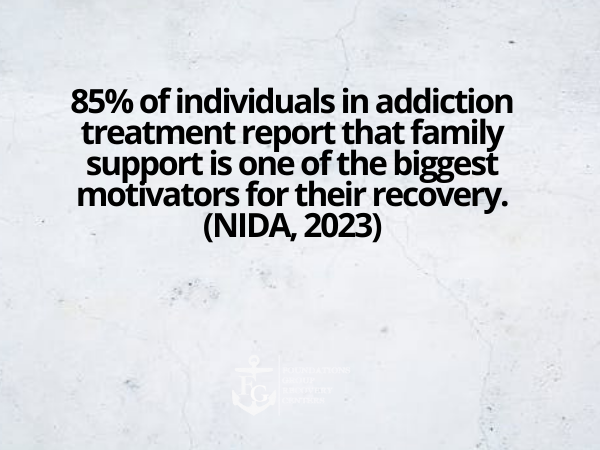When a loved one enters addiction treatment, it can be an emotional and uncertain time for family and friends. While it’s a positive step toward recovery, many people struggle with how to offer the right support without overstepping boundaries or enabling destructive behaviors.
At Foundations Group Recovery Centers, we understand that addiction impacts not just the individual but their entire support network. Family and friends play a vital role in the healing process, and knowing how to support a loved one in treatment can make a significant difference in their recovery journey.
Whether they are undergoing Alcohol and Drug Detox, a Day Treatment Program, a Half Day Treatment Program, or an Outpatient Treatment Program, your encouragement and understanding can help them build a foundation for lasting sobriety.
Here are key ways to support a loved one while they are in addiction treatment.
1. Educate Yourself About Addiction and Recovery
One of the best ways to support a loved one is to understand addiction as a disease rather than a personal failure. Many people believe addiction is simply a matter of willpower, but research shows that substance use disorder is a chronic condition that alters brain chemistry and requires professional treatment.
Ways to Educate Yourself:
- Read about Substance Use Treatment and how different Addiction Treatment Programs work.
- Learn about the withdrawal process in Alcohol and Drug Detox to understand what they are going through.
- Familiarize yourself with relapse prevention strategies so you can better support their long-term recovery.
- Attend family support groups like Al-Anon or Nar-Anon to hear from others who have loved ones in recovery.
By understanding addiction and recovery, you can offer informed, nonjudgmental support that helps your loved one feel less isolated.
2. Maintain Healthy Communication
Many people in addiction treatment feel ashamed or fearful about how their loved ones view them. Open, supportive communication can help ease these concerns and create a positive environment for their recovery.
How to Communicate Supportively:
- Use positive reinforcement – Instead of saying, “I hope you don’t relapse again,” say, “I’m really proud of you for taking this step toward recovery.”
- Avoid blame or guilt-tripping – Saying, “You’ve put the family through so much,” can make them feel worse and discourage progress.
- Listen without judgment – Allow them to express their feelings without interrupting or offering solutions unless they ask.
- Encourage honesty – Let them know they can share their struggles without fear of rejection.
Even if they are in a structured treatment program like a Day Treatment Program or an Outpatient Treatment Program, maintaining consistent, healthy communication can make them feel supported.
3. Respect Their Boundaries and Treatment Plan
During addiction treatment, individuals are working through deep-seated emotional and psychological challenges. They may set boundaries about when and how often they communicate or the topics they are comfortable discussing.
Ways to Respect Their Boundaries:
- Allow them space – They may not always be able to respond to messages or calls right away.
- Follow their treatment center’s guidelines – Some programs limit phone calls or family visits during early treatment to help them focus.
- Respect their privacy – Let them decide how much they want to share about their experiences in treatment.
Respecting boundaries reinforces trust and allows your loved one to focus fully on their recovery without feeling pressured.
4. Offer Emotional Support Without Enabling
There’s a fine line between supporting a loved one and enabling destructive behaviors. Enabling occurs when well-meaning actions remove the natural consequences of addiction, making it easier for the person to continue harmful patterns.
Examples of Enabling vs. Supportive Behavior:
| Enabling Behavior | Supportive Behavior |
|---|---|
| Paying for their drugs or alcohol | Encouraging them to use their own money responsibly |
| Making excuses for their substance use | Holding them accountable for their actions |
| Rescuing them from legal or work trouble | Encouraging them to take responsibility |
| Providing financial support without conditions | Offering help, but only if they remain in treatment |
By offering emotional support rather than enabling, you reinforce the importance of their recovery journey and help them develop self-sufficiency.
5. Participate in Family Therapy and Support Groups
Addiction doesn’t just affect the individual—it impacts the entire family unit. Many Addiction Treatment Centers offer family therapy programs that help loved ones rebuild trust, improve communication, and heal from past wounds.
Benefits of Family Therapy:
- Provides a safe space to express feelings and address past conflicts.
- Helps family members set healthy boundaries to prevent enabling.
- Teaches strategies to support long-term recovery without taking on the emotional burden alone.
- Reinforces the importance of a strong support system in addiction recovery.
If family therapy is not an option, consider joining a family support group like Al-Anon or Nar-Anon for ongoing guidance and community support.
6. Encourage Long-Term Treatment and Aftercare
Recovery doesn’t end after rehab—it’s a lifelong journey. Encouraging your loved one to continue treatment after detox or inpatient rehab can greatly improve their chances of long-term sobriety.
Ongoing Treatment Options:
- Outpatient Treatment Programs – Allows individuals to continue therapy while reintegrating into daily life.
- Day Treatment Programs – Provides structured therapy during the day while living at home.
- Half Day Treatment Programs – A step-down from intensive treatment, offering support while promoting independence.
- Sober living environments – A structured living situation that helps prevent relapse.
Encouraging your loved one to stay engaged in ongoing treatment helps reduce the risk of relapse and reinforces the importance of long-term support.
7. Take Care of Yourself Too
Supporting a loved one through addiction treatment can be emotionally exhausting. It’s important to prioritize your own well-being so that you can provide meaningful support without becoming overwhelmed.
Ways to Take Care of Yourself:
- Set healthy boundaries to avoid burnout.
- Seek individual therapy or counseling if needed.
- Join a support group to connect with others facing similar challenges.
- Engage in self-care activities like exercise, hobbies, and meditation.
Remember, you cannot pour from an empty cup—taking care of yourself allows you to support your loved one more effectively.
Helping Your Loved One Find Recovery at Foundations Group Recovery Centers
If your loved one is in treatment or considering seeking help, Foundations Group Recovery Centers offers comprehensive Addiction Treatment Programs tailored to their needs.
Our Programs Include:
- Alcohol and Drug Detox for safe withdrawal
- Day Treatment and Half Day Treatment Programs for structured recovery
- Outpatient Treatment Programs for continued support
- Family therapy and relapse prevention planning
Supporting a loved one through treatment can be challenging, but you are not alone. Contact Foundations Group Recovery Centers today to learn how we can help your family navigate recovery together.
Final Thoughts
Having a loved one in addiction treatment is an emotional journey, but your support can be a powerful tool in their recovery. By educating yourself, maintaining healthy communication, setting boundaries, and encouraging long-term treatment, you can help them build a strong foundation for sobriety.
Recovery is a lifelong process, but with the right support, healing is possible. If your loved one is ready to take the next step, Call 844.763.4966 Foundations Group Recovery Centers is here to provide the professional care they need.
FAQ on Support in Addiction Treatment
How can I best support my loved one while they are in addiction treatment?
The best way to support them is to educate yourself about addiction, maintain open communication, respect their treatment plan, and avoid enabling behaviors. Encouraging them to stay in treatment and participate in aftercare programs can also help.
What should I avoid doing while my loved one is in rehab?
Avoid guilt-tripping, shaming, or pressuring them to communicate before they are ready. Also, refrain from enabling behaviors like covering up their mistakes, providing financial support without conditions, or making excuses for them.
Should I attend family therapy or support groups?
Yes. Family therapy and support groups like Al-Anon and Nar-Anon can help you process your own emotions and learn how to support your loved one effectively. Many Addiction Treatment Centers offer family therapy sessions.
What happens after my loved one completes treatment?
Recovery is an ongoing process. After completing a program, they may transition into Outpatient Treatment, a Day Treatment Program, or a Half Day Treatment Program for continued support. Encouraging them to attend therapy, sober living, and support groups can help them maintain sobriety.
What if my loved one relapses?
Relapse is common and does not mean treatment has failed. Instead of reacting with anger or disappointment, encourage them to re-engage with treatment. Many people return to Outpatient or Day Treatment Programs after a relapse to reinforce their recovery skills.
How do I take care of myself while supporting a loved one in treatment?
Prioritize your own mental and emotional health by setting boundaries, seeking therapy, joining support groups, and engaging in self-care activities. Supporting a loved one should not come at the expense of your own well-being.


